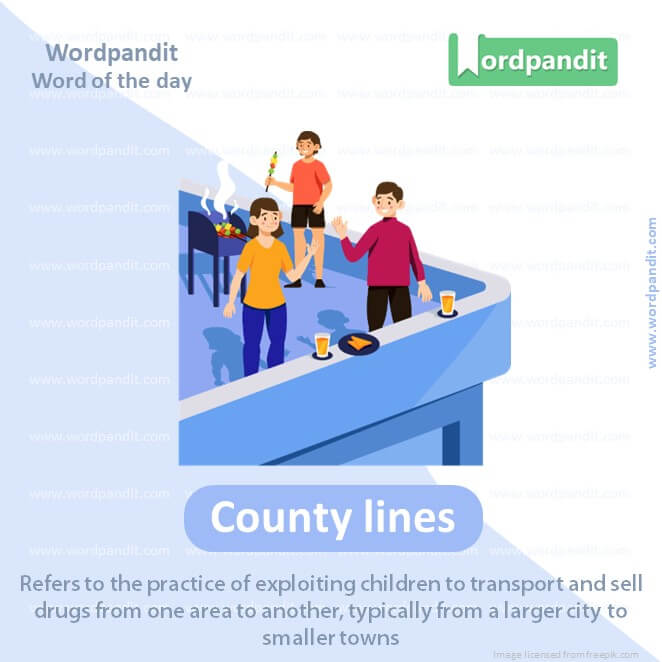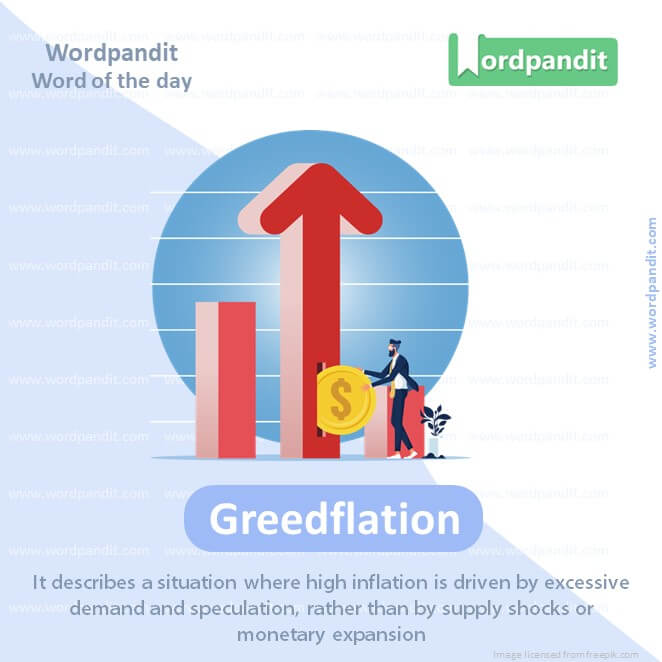Daily Vocabulary Words: List of Daily Used Words
Hi there. Welcome to this special section @ Wordpandit.
Our endeavour here is straightforward: highlighting important daily vocabulary words, you would encounter in The Hindu. This is your repository of commonly used words; essentially, we are posting a list of daily used words. Hence, this has significant practical application as it teaches you words that are commonly used in a leading publication such as The Hindu.
Visit the website daily to learn words from The Hindu.

WORD-1: COUNTY LINES
CONTEXT: The report, published in The Hindu newspaper, depicted a deeply concerning wave of crime within the so-called ‘county lines’ phenomenon, which is centered around metropolitan urban networks supplying drugs out to provincial areas.
SOURCE: The Hindu
EXPLANATORY PARAGRAPH: Imagine if big cities like Delhi sent gangs to smaller towns nearby to sell drugs, this would be known as county lines. It’s a network of drug dealing that stretches from big, bustling cities to smaller, quieter towns.
MEANING: Refers to the practice of exploiting children to transport and sell drugs from one area to another, typically from a larger city to smaller towns (Phrase).
PRONUNCIATION: coun-ty lines
SYNONYMS: Drug routes, Narcotics networks, Drug distribution lines, Illicit drug supply chains, Undercover drug trade
USAGE EXAMPLE:
1. The police are investigating the recent surge in county lines drug dealing.
2. He was innocent, having no connection to the county lines operation.
3. County lines have caused an increase in crime rates in rural areas.
4. Many county lines are operated by sophisticated criminal networks.

WORD-2: CRONYISM
CONTEXT: An op-ed column in The Hindu newspaper discussed the implications of crony capitalism, where politicians and businessmen are accused of favoritism or cronyism, disrupting the country’s economic growth.
SOURCE: The Hindu
EXPLANATORY PARAGRAPH: Cronyism is like when your teacher only gives the best snacks to her favorite students and ignores the others. It’s when someone in power favors their close friends rather than who might be right for the job.
MEANING: The appointment of friends and associates to positions of authority, without proper regard to their qualifications (Noun).
PRONUNCIATION: Kroh-nee-izm
SYNONYMS: Favoritism, Partisanship, Nepotism, Preferential treatment, Biased favoritism, Unfair preference, Partiality
USAGE EXAMPLE:
1. He lost his job due to the cronyism prevalent in his company.
2. Cronyism is a common issue in corrupt governments.
3. The mayor was criticized for cronyism when he appointed his brother.
4. The new rule was implemented to avoid cronyism in the office.

WORD-3: GREEDFLATION
CONTEXT: In a report by The Hindu, the upward pricing trend in the real estate sector was termed ‘greedflation,’ a scenario where prices skyrocket not due to market forces, but from the unregimented greed of stakeholders.
SOURCE:The Hindu
EXPLANATORY PARAGRAPH: Greedflation is like when you keep raising your toy’s price, not because it’s better, but just because you want more money. So, it is when people increase prices just because of their greed.
MEANING: It describes a situation where high inflation is driven by excessive demand and speculation, rather than by supply shocks or monetary expansion (Noun).
PRONUNCIATION: Greed-flay-shun
SYNONYMS: Price gouging, Profiteering, Inflation exploitation, Exploitative pricing, Hyperinflation
USAGE EXAMPLE:
1. Greedflation is causing higher prices at the mall.
2. The CEO warned against the unchecked greedflation in the housing market.
3. The surge in prices was not due to demand, but rather greedflation.
4. The authorities need to take strict measures to control greedflation.

WORD-4: MUGGED OFF
CONTEXT: An article in The Hindu newspaper used the term ‘mugged off’ in the context of a political party feeling cheated or disregarded by its coalition partner after electoral results.
SOURCE:The Hindu
EXPLANATORY PARAGRAPH: Mugged off is like when your friend promised to trade their shiny sticker for your chocolate, but then they don’t. It’s when someone tricks or disrespects you.
MEANING: Slang term, meaning to be taken advantage of or treated disrespectfully (Verb).
PRONUNCIATION: Muhged-awf
SYNONYMS: Cheated, Deceived, Disrespected, Scammed, Tricked, Duped, Misled
USAGE EXAMPLE:
1. He felt mugged off when his friend didn’t keep his promise.
2. You will get mugged off if you trust scam emails.
3. Being mugged off is a common experience in online shopping.
4. She was mugged off in the deal and lost her money.

WORD-5: SUFFRAGETTES
CONTEXT: The Hindu newspaper ran a piece commemorating the suffragettes, women who fought for the right to vote in the early 20th century, and their contributions to modern democracy.
SOURCE:The Hindu
EXPLANATORY PARAGRAPH: Suffragettes were brave women, just like your mom and grandma, who fought really hard so that women like them could vote. They wanted everyone to have a say in decisions that affect them.
MEANING: Early activists for women’ right to vote (Noun).
PRONUNCIATION: Su-fruh-jets
SYNONYMS: Activists, Women’s rights advocates, Protestors, Feminist campaigners, Campaigners, Women’s suffrage activists
USAGE EXAMPLE:
1. The suffragettes played an important role in securing voting rights for women.
2. The museum had an exhibition on the struggle of suffragettes.
3. Many suffragettes were imprisoned for their protests.
4. The movie is about the iconic suffragettes of the early 20th century.
WORD-6: EPHEMERAL
CONTEXT: In an article on Environment conservation, The Hindu described the ephemeral nature of some endangered species, highlighting the urgent need for immediate conservation efforts.
SOURCE: The Hindu
EXPLANATORY PARAGRAPH: When something like your ice cream melts away fast and doesn’t last very long, that’s what we call ephemeral. It’s anything that is here one moment and gone the next!
MEANING: Lasting for a short time (Adjective).
PRONUNCIATION: eh-fem-er-uhl
SYNONYMS: Brief, Transitory, Temporary, Short-lived, Momentary, Transient, Fleeting
USAGE EXAMPLE:
1. The rainbow is an ephemeral beauty that disappears with the slightest change in weather.
2. The movie captured the ephemeral nature of childhood.
3. Their happiness was ephemeral; they knew the difficulties lay ahead.
4. Flowers are ephemeral; their beauty fades within a day or two.
WORD-7: RENDERED
CONTEXT: The Hindu talked about how changes in climatic patterns have rendered many traditional farming methods ineffective in a feature article about agriculture.
SOURCE: The Hindu
EXPLANATORY PARAGRAPH: Rendered is like when Mom turns apples into apple juice. It’s when something is made into something else or becomes something else.
MEANING: To cause to be or become; make (Verb).
PRONUNCIATION: ren-derd
SYNONYMS: Produced, Transformed, Converted, Turned, Changed, Altered, Made
USAGE EXAMPLE:
1. The cool temperatures rendered his coffee cold in minutes.
2. The disaster rendered the city unrecognizable.
3. The chef rendered the vegetables into a delightful soup.
4. The harsh weather has rendered the fruit crops useless this year.
WORD-8: AKIN
CONTEXT: In a thought-provoking article by The Hindu, it was explained how artificial intelligence is becoming increasingly akin to human intelligence, raising numerous ethical questions.
SOURCE: The Hindu
EXPLANATORY PARAGRAPH: Akin is like how your toy car is very much like or similar to your big sister’s toy car. Something akin to another thing is just like it in some way.
MEANING: Similar, related, or alike (Adjective).
PRONUNCIATION: uh-kin
SYNONYMS: Similar, Kindred, Commensurate, Analogous, Comparable, Resembling, Like
USAGE EXAMPLE:
1. Their music is akin to the legendary rock bands of the ’90s.
2. His feelings for her were akin to adoration.
3. The current economic crisis is akin to that of a decade ago.
4. She has a style of singing akin to the famed opera singers.
WORD-9: HACKED
CONTEXT: The Hacked concept was covered in an article by The Hindu when it reported major data breaches in major corporations, exposing customer information to potential hackers.
SOURCE: The Hindu
EXPLANATORY PARAGRAPH: Hacked is like when someone takes your toy without asking and then starts playing with it. In the world of computers, it means when someone accesses your computer or account without permission because they want to see or use your stuff.
MEANING: Gained unauthorized access to data in a system or computer (Verb).
PRONUNCIATION: hakd
SYNONYMS: Exploited, Breached, Cracked, Intruded, Violated, Accessed, Infiltrated
USAGE EXAMPLE:
1. My email account was hacked and used for sending spam emails.
2. He was a victim of a hacked credit card.
3. The company’s security was not robust enough and got hacked.
4. The private details of the celebrities were exposed after their phones were hacked.
WORD-10: ERRATIC
CONTEXT: Erratic weather patterns and their impact on several farming communities have been covered extensively in a series of articles by The Hindu.
SOURCE: The Hindu
EXPLANATORY PARAGRAPH: Erratic is like when your bouncy ball goes in all different directions when you throw it. It’s when something or someone doesn’t follow a set path or expected behaviour, but instead acts unpredictable and different.
MEANING: Not even or regular in pattern or movement; unpredictable (Adjective).
PRONUNCIATION: eh-rat-ik
SYNONYMS: Unpredictable, Unstable, Inconsistent, Changeable, Irregular, Irresponsible, Volatile.
USAGE EXAMPLE:
1. His erratic behaviour worried his friends.
2. Her grades were erratic throughout the year.
3. The erratic weather patterns are causing issues for the local farmers.
4. The erratic movement of the stock market left investors nervous.
Vocabulary
Language is a confluence of thoughts, emotions, and experiences that find vibrant expression through words. In this spectrum, ‘vocabulary’ shines as a critical aspect that shapes and directs our language proficiency. It offers depth, nuance, and clarity to our expressions. However, mastering ‘vocabulary’ is an art that requires a strategized approach.
An intensive strategy for learning ‘vocabulary’ goes beyond the limiting precincts of memorization. Instead, it nudges learners towards comprehension and application. To understand ‘vocabulary’, take a step forward from traditional textbooks and classroom sessions, and embrace the vast world of books, articles, podcasts or digital content in the language you are learning. This step allows you to understand words in context, see how they are used in different situations, and absorb words as part of the natural flow of language.
As you journey through ‘vocabulary’, remember that this expedition should not be a race. Rather, it’s a marathon where pacing yourself is pivotal to long-term success. Learning a few words each day and consolidating your knowledge through regular revision tends to be more effective, as it prevents cognitive overload and promotes solid retention.
Interactive learning tools can provide valuable support in assimilating ‘vocabulary’. Use of flashcards, language-learning apps, or memory-enhancing software can make this process more engaging and effective, reinforcing the ‘vocabulary’ in your memory.
Lastly, practice is an incontrovertible part of mastering ‘vocabulary’. Utilize the learnt vocabulary in your daily conversations, write-ups, or presentations to ensure an active application. Doing this fosters recall and cements understanding.
In summation, learning ‘vocabulary’ is a journey that should be embraced with an integrated approach, where understanding and application are the key elements. By engaging with diverse learning resources, pacing the learning process, employing interactive learning tools, and practicing regularly, the journey of mastering ‘vocabulary’ becomes a fulfilling and enriching experience.













